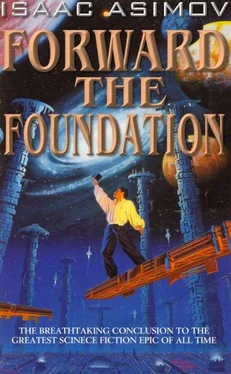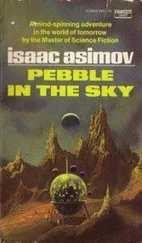“It gave rise to the notion that social dynamics has its conservation laws as physics does and that, in fact, it is these laws that offer us the best possible tools for solving the truly troublesome aspects of psychohistory.”
Dors said, “Rather impressive, but what if you end up finding that nothing at all can be changed, that everything that is bad is conserved, and that to save the Empire from destruction is merely to increase destruction of another kind?”
“Actually some have suggested that, but I don’t believe it.”
“Very well. Back to reality. Is there anything in the frictional problems within the Project that threaten Hari? I mean, with physical harm.”
“Harm Hari? Of course not. How can you suggest such a thing?”
“Might there not be some who resent Hari, for being too arrogant, too pushy, too self-absorbed, too eager to grab all the credit? Or, if none of these things apply, might they not resent him simply because he has run the Project for so long a time?”
“I never heard anyone say such a thing about Hari.”
Dors seemed dissatisfied. “I doubt that anyone would say such things in your hearing, of course. But thank you, Yugo, for being so helpful and for giving me so much of your time.”
Amaryl stared after her as she left. He felt vaguely troubled, but then returned to his work and let other matters drift away.
One way Hari Seldon had (out of not too many ways) for pulling away from his work for a time was to visit Raych’s apartment, just outside the University grounds. To do this invariably filled him with love for his foster son. There were ample grounds. Raych had been good, capable, and loyal—but besides that was the strange quality Raych had of inspiring trust and love in others.
Hari had observed it when Raych was a twelve-year-old street boy, who somehow pulled at his own and at Dors’s heartstrings. He remembered how Raych had affected Rashelle, the onetime Mayor of Wye. Hari remembered how Joranum had trusted Raych, which led to his own destruction. Raych had even managed to win the heart of the beautiful Manella. Hari did not completely understand this particular quality that Raych embodied, but he enjoyed whatever contact he had with his foster son.
He entered the apartment with his usual “All well here?”
Raych put aside the holographic material he was working with and rose to greet him, “All well, Dad.”
“I don’t hear Wanda.”
“For good reason. She’s out shopping with her mother.”
Seldon seated himself and looked good-humoredly at the chaos of reference material. “How’s the book coming?”
“It’s doing fine. It’s me who might not survive.” He sighed. “But for once, we’ll get the straight poop on Dahl. Nobody’s ever written a book devoted to that section, wouldja believe?”
Seldon had always noted that, whenever Raych talked of his home sector, his Dahlite accent always strengthened.
Raych said, “And how are you, Dad? Glad the festivities are over?”
“Enormously. I hated just about every minute of it.”
“Not so anyone could notice.”
“Listen, I had to wear a mask of sorts. I didn’t want to spoil the celebration for everyone else.”
“You must have hated it when Mom chased after you onto the Palace grounds. Everyone I know has been talking about that.”
“I certainly did hate it. Your mother, Raych, is the most wonderful person in the world, but she is very difficult to handle. She might have spoiled my plans.”
“What plans are those, Dad?”
Seldon settled back. It was always pleasant to speak to someone in whom he had total trust and who knew nothing about psychohistory. More than once he had bounced thoughts off Raych and had worked them out into more sensible forms than would have been the case if those same thoughts had been mulled over in his mind. He said, “Are we shielded?”
“Always.”
“Good. What I did was to set General Tennar thinking along curious lines.”
“What lines?”
“Well, I discussed taxation a bit and pointed out that, in the effort to make taxation rest evenly on the population, it grew more and more complex, unwieldy, and costly. The obvious implication was that the tax system must be simplified.”
“That seems to make sense.”
“Up to a point, but it is possible that, as a result of our little discussion, Tennar may oversimplify. You see, taxation loses effectiveness at both extremes. Overcomplicate it and people cannot understand it and pay for an overgrown and expensive tax organization. Oversimplify it and people consider it unfair and grow bitterly resentful. The simplest tax is a poll tax, in which every individual pays the same amount, but the unfairness of treating rich and poor alike in this way is too evident to overlook.”
“And you didn’t explain this to the General?”
“Somehow, I didn’t get a chance.”
“Do you think the General will try a poll tax?”
“I think he will plan one. If he does, the news is bound to leak out and that alone would suffice to set off riots and possibly upset the government.”
“And you’ve done this on purpose, Dad?”
“Of course.”
Raych shook his head. “I don’t quite understand you, Dad. In your personal life, you’re as sweet and gentle as any person in the Empire. Yet you can deliberately set up a situation in which there will be riots, suppression, deaths. There’ll be a lot of damage done, Dad. Have you thought of that?”
Seldon leaned back in his chair and said sadly, “I think of nothing else, Raych. When I first began my work on psychohistory, it seemed a purely academic piece of research to me. It was something that could not be worked out at all, in all likelihood, and, if it was, it would not be something that could be practically applied. But the decades pass and we know more and more and then comes the terrible urge to apply it.”
“So that people can die?”
“No, so that fewer people can die. If our psychohistorical analyses are correct now, then the junta cannot survive for more than a few years and there are various alternative ways in which it can collapse. They will all be fairly bloody and desperate. This method—the taxation gimmick—should do it more smoothly and gently than any other if—I repeat—our analyses are correct.”
“If they’re not correct, what then?”
“In that case, we don’t know what might happen. Still, psychohistory must reach the point where it can be used and we’ve been searching for years for something in which we have worked out the consequences with a certain assuredness and can find those consequences tolerable as compared with alternatives. In a way, this taxation gimmick is the first great psychohistoric experiment.”
“I must admit, it sounds like a simple one.”
“It isn’t. You have no idea how complex psychohistory is. Nothing is simple. The poll tax has been tried now and then throughout history. It is never popular and it invariably gives rise to resistance of one form or another, but it almost never results in the violent overthrow of a government. After all, the powers of governmental oppression may be too strong or there may be methods whereby the people can bring to bear their opposition in a peaceful manner and achieve redress. If a poll tax were invariably or even just sometimes fatal, then no government would ever try it. It is only because it isn’t fatal that it is tried repeatedly. The situation on Trantor is, however, not exactly normal. There are certain instabilities that seem clear in psychohistorical analysis, which make it seem that resentment will be particularly strong and repression particularly weak.”
Raych sounded dubious. “I hope it works, Dad, but don’t you think that the General will say that he was working under psychohistorical advice and bring you down with him?”
Читать дальше











